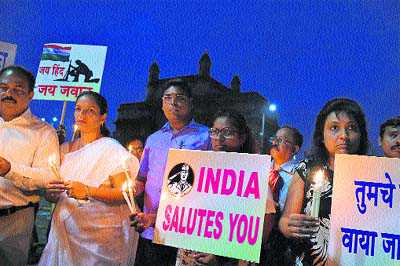
STRATEGIC EDGE: India must formulate a concrete counter-terrorism policy.
AS someone who has tried to secure Jammu and Kashmir while serving in India’s internal security apparatus and handled the affairs of the State from Delhi for almost a decade, I was shocked and pained to learn from the electronic media that a fidayeen attack on our Army post in Uri before the crack of dawn had killed 18 of our jawans. More shocking because the incident has come so soon after a similar attack on a sensitive Air Force base in Pathankot, and after a pinpointed intelligence input that a group of seven armed terrorists had infiltrated from the Pakistan-occupied Kashmir and were hiding to launch an attack on a military base in Uri. Reactions to the attack on our Army post aired in the electronic media were to say the least, disappointing. Political leaders in one voice were blaming Pakistan, dubbing it a “terrorist state”, an act of “cowardice”, etc. and assuring us that “the culprits shall not be allowed to go unpunished”. Leaders of a few opposition parties began fishing in troubled waters and blaming Prime Minister Narendra Modi for the attack! Not very convincing.That Pakistan’s ISI will stop arming, training and infiltrating jihadi terrorists into our country is wishful thinking. That is not happening. The Pakistan army, which wields real power in its country, has a vested interest in keeping Kashmir on the boil. If peace returns to Jammu and Kashmir, the Pakistan army runs the risk of being ordered back to the barracks and lose all the perks it is enjoying at present. So let us be realistic in our objectives, and find solutions to our security needs ourselves.Speculations are rife today in the print and electronic media about retaliatory action to send out a clear message to Pakistan that enough is enough. We will not take this anymore. It brings along a feeling of déjà vu — similar meetings at the highest levels in the Ministry of Defence, the Ministry of Home Affairs and the Prime Minister’s Office were held after the Mumbai terrorist attacks, and no workable retaliatory action against Pakistan could be arrived at then, or is likely to emerge now.I have another question for our political leadership, when are we going to stop blaming our neighbour and exercise our right to defend our sovereignty with all our might? I am not suggesting a military attack against Pakistan. Knowing that the nuclear button across the border is in the hands of Pakistan army generals with fanatical and insane Islamic fanatics breathing down their necks, and not the democratically elected leaders — as is in India — could well cause a major catastrophe. But why not bleed them, the way that they are bleeding us? There are masters of the game — past and present — in our security establishment who know what needs to be done in this situation and how. Let the political leadership at the highest level give them the go-ahead without making public announcements. There is no time to lose. The time to act on this strategy has come. It is now.Another worrisome issue thrown up by the Uri attack is lack of adequate fortification of a sensitive defence post. A combination of high-technology barriers manned by a trained and alert manpower should have prevented the two-point intrusions by a heavily armed terrorist group at the border; and inside the Army camp for sure. The Uri Army base is a very commanding high-ground strategic location, with a bird’s-eye view of the contiguous Pakistan-occupied Kashmir. This strategic advantage to us came via the Simla Agreement after the India-Pakistan war of 1965. It was my favourite border post to visit while serving in the Kashmir Valley way back, because of the scenic drive in a Jonga along the winding hill road with the Jhelum flowing on one side and a wooden piped canal on the other — an engineering marvel built long ago in the times of Maharaja Hari Singh. My visits to Uri after meetings with the Army and other agencies’ representatives and our own Post I/C were always very satisfying. Appealing to the international community to declare Pakistan as a state sponsor of terrorism, as we are doing now, is also not going to help, as each country is riddled by its own set of problems, and may not have the time to take into account our problem. We can, at best, expect condemnations and moral support from the comity of nations, but little beyond that. Let us face the fact that we are one of the most highly threatened countries in terms of jihadi terrorism, and perhaps the least prepped or willing to learn from past attacks. It is time to change that truth.— The writer is a former Secretary (Internal Security), MHA
